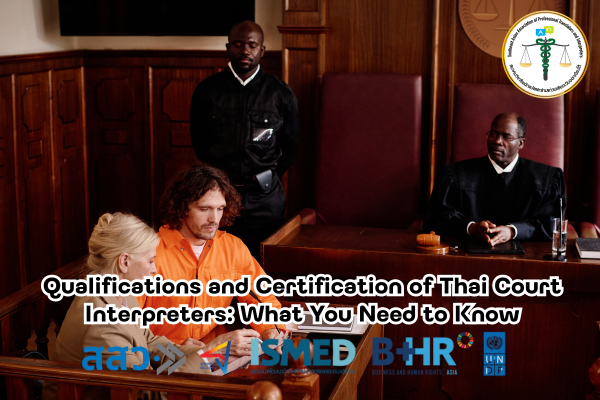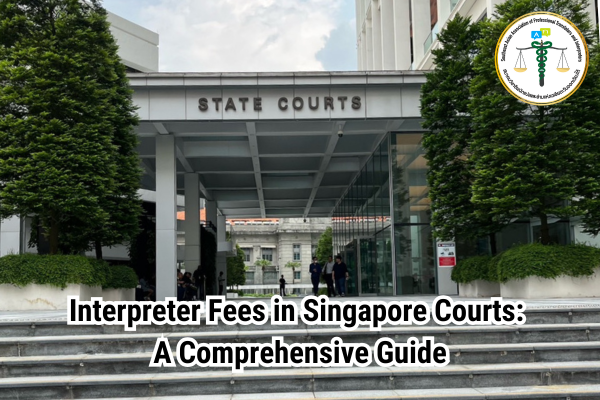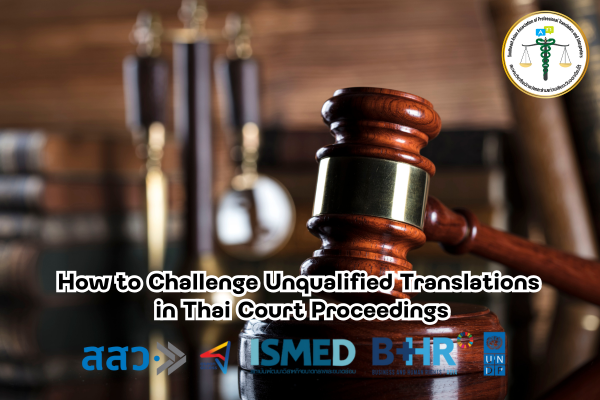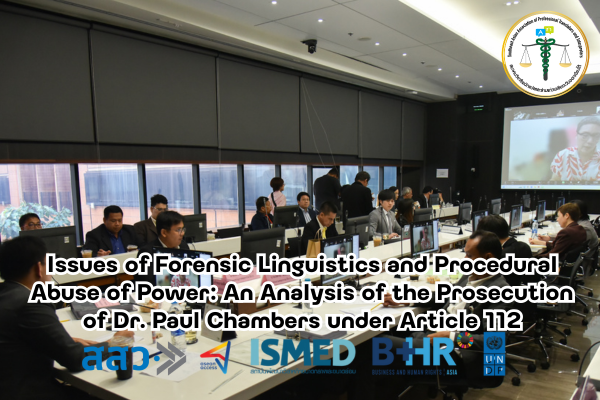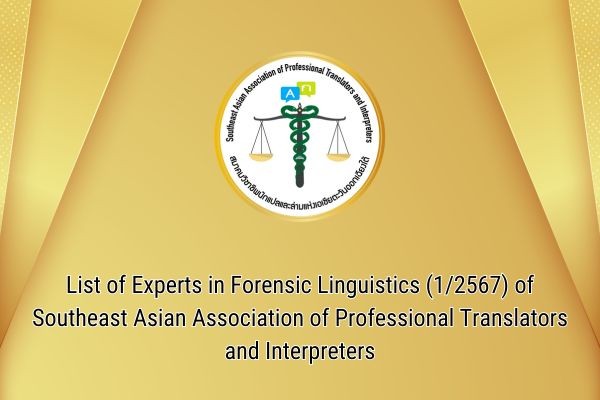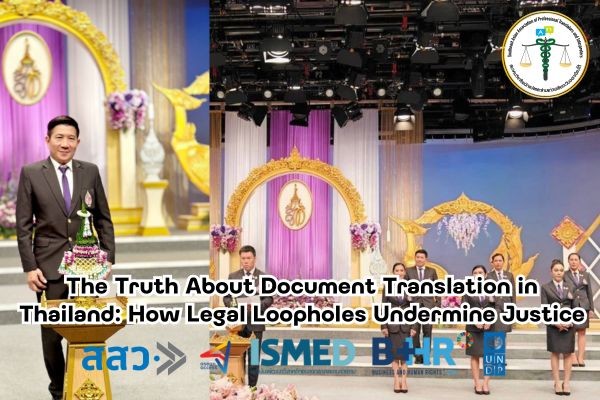Qualifications and Certification of Thai Court Interpreters: What You Need to Know
27 April 2025, Bangkok – In Thailand, court interpreters play a crucial role in ensuring fair trials by facilitating communication for non-Thai speakers. However, not just anyone who speaks two languages can step into a courtroom and serve as an interpreter. The path to becoming a qualified Thai court interpreter involves a combination of language proficiency, legal expertise, formal certification, and practical experience.
In this article, we will explore the essential qualifications required for Thai court interpreters and the certification standards that uphold the integrity of legal proceedings in Thailand.
1. Language Proficiency: The Foundation of Court Interpreting
A Thai court interpreter must possess native or near-native fluency in Thai and at least one foreign language, most commonly English. It is not enough to simply be bilingual; interpreters must demonstrate the ability to handle complex legal terminology, formal phrasing, and communication nuances with precision.
Excellent command of both the source and target languages is critical. Court interpreting often requires real-time translation of sophisticated legal concepts, technical jargon, witness testimonies, and cross-examinations — all without room for error.
2. Legal Knowledge and Practical Courtroom Experience
Understanding the law is just as important as linguistic ability. A professional Thai court interpreter must have substantial knowledge of legal proceedings, courtroom protocols, and judicial terminology.
They must be able to:
- Interpret complex phrasing accurately.
- Navigate the formalities of court speech.
- Recognize and adapt to legal nuances in questioning and testimony.
- Remain composed under the pressure of live, high-stakes situations.
Prior experience working within courtrooms, law offices, or legal consultations significantly enhances an interpreter’s ability to perform effectively in a judicial setting.
3. Certification and Professional Training
Certification serves as a formal acknowledgment of an interpreter’s competency and professionalism. In Thailand, certified court interpreters typically undergo rigorous training programs offered by:
- Professional associations such as the Southeast Asian Association of Professional Translators and Interpreters (SEAProTI)
Certification programs often include:
- Legal translation and interpreting training
- Practical examinations in consecutive and simultaneous interpreting
- Ethics training specific to judicial settings
- Verification of bilingual fluency and professional demeanor
Certified court interpreters are held to strict professional and ethical standards, ensuring that they maintain impartiality, confidentiality, and cultural sensitivity at all times.
4. Formal Accreditation by Thai Courts
Beyond certification, some interpreters receive official accreditation from the Thai Judiciary. This formal recognition signifies that the interpreter:
- Has passed stringent qualifying examinations.
- Is listed in the official registry of interpreters trusted by the courts.
- Has the legal standing to serve in criminal, civil, family, and administrative court proceedings.
Accreditation ensures the interpreter’s validity, credibility, and reliability, providing courts and litigants with confidence in the integrity of the interpretation provided.
5. Professional Standards and Ethical Conduct
Thai court interpreters are expected to demonstrate unwavering professionalism, including:
- Accuracy: Faithfully rendering every utterance without omissions or additions.
- Impartiality: Avoiding bias or influence in any form.
- Cultural Sensitivity: Respecting cultural differences that could affect communication.
- Confidentiality: Protecting sensitive information shared in court.
Their conduct directly impacts the fairness of trials and the administration of justice.
Conclusion: Becoming a Certified Thai Court Interpreter
The path to becoming a qualified Thai court interpreter demands more than bilingual skills. It requires a deep understanding of both language and law, verified through certification and accreditation processes. Only interpreters who meet these stringent qualifications can ensure that the judicial process remains fair, transparent, and accessible to all parties.
For those seeking to hire or become a court interpreter in Thailand, always look for certification from recognized bodies like SEAProTI or accreditation from the Thai Judiciary. Ensuring that your interpreter is certified and qualified is not just a procedural formality — it is a vital safeguard for justice.
SEAProTI’s certified translators, translation certification providers, and certified interpreters:
The Southeast Asian Association of Professional Translators and Interpreters (SEAProTI) has officially announced the criteria and qualifications for individuals to register as “Certified Translators,” “Translation Certification Providers,” and “Certified Interpreters” under the association’s regulations. These guidelines are detailed in Sections 9 and 10 of the Royal Thai Government Gazette, issued by the Secretariat of the Cabinet under the Office of the Prime Minister of the Kingdom of Thailand, dated July 25, 2024, Volume 141, Part 66 Ng, Page 100.
To read the full publication, visit: the Royal Thai Government Gazette
คุณสมบัติและการรับรองล่ามศาลในประเทศไทย: สิ่งที่คุณควรรู้
27 เมษายน 2568, กรุงเทพ – ในประเทศไทย ล่ามศาล มีบทบาทสำคัญในการส่งเสริมการพิจารณาคดีอย่างเป็นธรรม โดยทำหน้าที่สื่อสารสำหรับผู้ที่ไม่สามารถใช้ภาษาไทยได้โดยตรง อย่างไรก็ตาม ไม่ใช่ว่าใครที่พูดได้สองภาษาจะสามารถทำหน้าที่ล่ามในศาลได้ทันที เส้นทางสู่การเป็น ล่ามศาลที่มีคุณสมบัติเหมาะสมในประเทศไทย ต้องประกอบด้วยความเชี่ยวชาญทางภาษา ความรู้ด้านกฎหมาย การได้รับการรับรองอย่างเป็นทางการ และประสบการณ์การทำงานจริงในศาล
บทความนี้จะพาคุณไปรู้จักคุณสมบัติสำคัญของล่ามศาลไทย และมาตรฐานการรับรองที่ใช้ค้ำจุนความยุติธรรมในกระบวนการพิจารณาคดีในประเทศไทย
1. ความเชี่ยวชาญทางภาษา: พื้นฐานของการล่ามศาล
ล่ามศาลในประเทศไทย ต้องมีความสามารถในภาษาไทยในระดับเจ้าของภาษา หรือใกล้เคียง และเชี่ยวชาญในภาษาต่างประเทศอย่างน้อยหนึ่งภาษา โดยทั่วไปคือภาษาอังกฤษ การมีความสามารถเพียงแค่ “พูดได้สองภาษา” นั้นไม่เพียงพอ แต่ต้องสามารถจัดการกับ ศัพท์กฎหมายที่ซับซ้อน สำนวนทางการ และความละเอียดอ่อนทางการสื่อสารได้อย่างแม่นยำ
การควบคุมภาษาได้อย่างยอดเยี่ยมทั้งต้นทางและปลายทางจึงเป็นสิ่งจำเป็น เพราะการล่ามในศาลมักเกี่ยวข้องกับการแปลแบบทันทีของแนวคิดทางกฎหมายที่ซับซ้อน ข้อความเฉพาะทาง คำให้การ และการซักถาม ซึ่งไม่สามารถเกิดความผิดพลาดได้เลย
2. ความรู้ด้านกฎหมายและประสบการณ์ในห้องพิจารณาคดี
ความเข้าใจเรื่องกฎหมายมีความสำคัญไม่แพ้ทักษะทางภาษา ล่ามศาลมืออาชีพในประเทศไทย ต้องมีความรู้เชิงลึกเกี่ยวกับ
- กระบวนการพิจารณาคดี
- ระเบียบพิธีการในศาล
- คำศัพท์กฎหมายเฉพาะทาง
ล่ามต้องสามารถ:
- แปลถ้อยคำที่ซับซ้อนได้อย่างถูกต้อง
- เข้าใจรูปแบบการใช้ภาษาทางการในศาล
- รับรู้และถ่ายทอดความหมายที่แฝงอยู่ในคำถามและคำให้การ
- มีความสามารถควบคุมอารมณ์และความกดดันระหว่างการล่ามสดในการพิจารณาคดี
ประสบการณ์การทำงานในศาล สำนักงานกฎหมาย หรือการให้บริการล่ามทางกฎหมาย จะช่วยเสริมสร้างความสามารถและความมั่นใจในการทำหน้าที่อย่างมืออาชีพ
3. การรับรองและการฝึกอบรมวิชาชีพ
การรับรองคุณวุฒิ เป็นหลักฐานแสดงถึงความเชี่ยวชาญและความเป็นมืออาชีพของล่ามศาล ในประเทศไทย ล่ามศาลที่ผ่านการรับรองจะต้องผ่าน หลักสูตรการฝึกอบรมอย่างเข้มข้น จากหน่วยงานที่ได้รับการยอมรับ เช่น:
- สมาคมวิชาชีพ เช่น สมาคมวิชาชีพนักแปลและล่ามแห่งเอเชียตะวันออกเฉียงใต้ (SEAProTI)
หลักสูตรการรับรองทั่วไปประกอบด้วย:
- การอบรมการแปลและล่ามทางกฎหมาย
- การสอบปฏิบัติจริงทั้ง การล่ามแบบพูดตาม (Consecutive) และ การล่ามพร้อมกัน (Simultaneous)
- การฝึกจรรยาบรรณเฉพาะด้านการล่ามในกระบวนการยุติธรรม
- การประเมินทักษะภาษาคู่ขนานกับการประเมินความประพฤติวิชาชีพ
ล่ามที่ได้รับการรับรองจะต้องยึดมั่นในมาตรฐานวิชาชีพสูงสุด ทั้งในด้านความแม่นยำ ความเป็นกลาง การรักษาความลับ และการเคารพวัฒนธรรม
4. การขึ้นทะเบียนรับรองอย่างเป็นทางการโดยศาลไทย
นอกจากการรับรองเบื้องต้นแล้ว ล่ามบางคนยังได้รับ การขึ้นทะเบียนอย่างเป็นทางการโดยศาลยุติธรรมไทย ซึ่งหมายความว่า
- ผ่านการสอบคัดเลือกอย่างเข้มข้น
- ได้รับการบรรจุอยู่ในบัญชีรายชื่อล่ามศาลที่เป็นทางการ
- มีสิทธิ์ปฏิบัติงานในคดีอาญา คดีแพ่ง คดีครอบครัว และคดีปกครอง
การขึ้นทะเบียนนี้เป็นหลักประกันให้กับศาล คู่ความ และสังคม ว่าล่ามศาลมี ความน่าเชื่อถือ ความถูกต้อง และความชำนาญ ตามมาตรฐานสูงสุด
5. มาตรฐานวิชาชีพและจรรยาบรรณในการทำงาน
ล่ามศาลในประเทศไทยต้องรักษามาตรฐานวิชาชีพอย่างเคร่งครัด ได้แก่:
- ความแม่นยำ: แปลถ้อยคำทุกประโยคโดยไม่ตัดทอน เพิ่มเติม หรือบิดเบือน
- ความเป็นกลาง: ไม่เอนเอียงหรือมีความคิดเห็นส่วนตัว
- ความละเอียดอ่อนทางวัฒนธรรม: เข้าใจและเคารพความแตกต่างทางวัฒนธรรม
- การรักษาความลับ: ปกป้องข้อมูลที่ได้ยินในระหว่างกระบวนการพิจารณาคดี
การปฏิบัติตนอย่างมืออาชีพมีผลโดยตรงต่อความเป็นธรรมของการพิจารณาคดี
บทสรุป: เส้นทางสู่การเป็นล่ามศาลที่ได้รับการรับรองในประเทศไทย
เส้นทางการเป็น ล่ามศาลที่มีคุณวุฒิในประเทศไทย ต้องอาศัยมากกว่าความสามารถในการพูดสองภาษา แต่ต้องมีความรู้กฎหมายลึกซึ้ง ผ่านการรับรองและขึ้นทะเบียนอย่างถูกต้อง และมีประสบการณ์ในการล่ามในสถานการณ์จริง
สำหรับผู้ที่ต้องการใช้บริการล่ามศาล หรือผู้ที่สนใจเข้าสู่อาชีพนี้ จำเป็นต้องตรวจสอบว่าล่ามได้รับการรับรองจากหน่วยงานที่เชื่อถือได้ เช่น SEAProTI หรือผ่านการขึ้นทะเบียนอย่างเป็นทางการจากศาลยุติธรรม เพื่อปกป้องสิทธิของทุกฝ่ายในกระบวนการยุติธรรมอย่างแท้จริง
เกี่ยวกับนักแปลรับรอง ผู้รับรองการแปล และล่ามรับรองของสมาคมวิชาชีพนักแปลและล่ามแห่งเอเชียตะวันออกเฉียงใต้
สมาคมวิชาชีพนักแปลและล่ามแห่งเอเชียตะวันออกเฉียงใต้ (SEAProTI) ได้ประกาศหลักเกณฑ์และคุณสมบัติผู้ที่ขึ้นทะเบียนเป็น “นักแปลรับรอง (Certified Translators) และผู้รับรองการแปล (Translation Certification Providers) และล่ามรับรอง (Certified Interpreters)” ของสมาคม หมวดที่ 9 และหมวดที่ 10 ในราชกิจจานุเบกษา ของสำนักเลขาธิการคณะรัฐมนตรี ในสำนักนายกรัฐมนตรี แห่งราชอาณาจักรไทย ลงวันที่ 25 ก.ค. 2567 เล่มที่ 141 ตอนที่ 66 ง หน้า 100 อ่านฉบับเต็มได้ที่: นักแปลรับรอง ผู้รับรองการแปล และล่ามรับรอง


